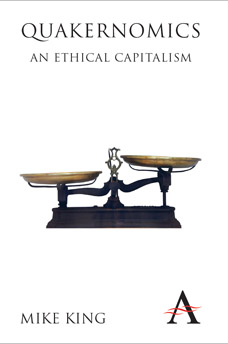

"Fascinating, highly relevant and opportune, this book is a powerful exploration of history showing how ethical behaviour has been – and can be – an effective route to wealth creation and growth. "
Carlota Perez, author of Technological Revolutions and Financial Capital and Centennial Professor at the London School of Economics
"Quakernomics presents a refreshing new way of thinking about economic activity, one which links the pursuit of profit with social justice."
David Vogel, Haas School of Business, University of California, Berkeley.
Comments from Amazon:
"Brilliant - not only as a testimony to the ethical business practices of many (but not all) Quaker entrepreneurs but also as a basic introduction to modern economic theories and their failings. Ethical capitalism is not a contradiction in terms but we are a long way from it at present!"
"This is a fascinating and informative review of the impact of Quakers in the industrial revolution, and a reflection on what this might mean in how we think politically and economically today."
"I'd read a bit about how successful Quakers in business have been historically, so it was great to find a book that fills out this picture with so much colour. It's a great hymn to their amazing contribution, as well as a valediction for a time gone by. The author uses the Quakers as a cultural case-study, drawing some general lessons from their experience that we could take forward into the modern marketplace, unfettered by their previous religious association. The book also usefully surveys a few hundred years of economic thought, so is an excellent primer."
Comments from Facebook:

Non-fiction, 2014, paperback (309 pages)
Anthem Press
Combining commercial success with philanthropy and social activism, Quakernomics offers a compelling model for corporate social responsibility in the modern world. Mike King explores the ethical capitalism of Quaker enterprises from the eighteenth to the twentieth centuries, testing this theory against those of prominent economists. With a foreword by Sir Adrian Cadbury, this book proves that the Quaker practice of ‘total capitalism’ is not a historically remote nicety but an immediately relevant guide for today’s global economy.